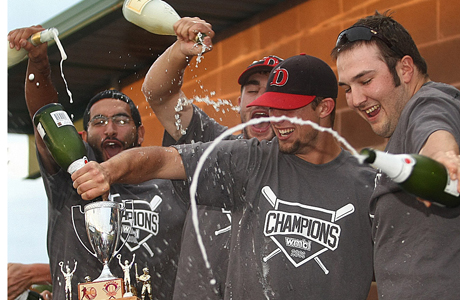
Left to right: Manny Kumar, Brett Thomas, Alex Jensen, Jeff Duda
They split the first two games of the series.
They felt the same sense of frustration as the rain fell.
And now the Melville Millionaires and Okotoks Dawgs will have to share
the one thing they wanted for themselves — the Western Major Baseball League championship.
“It’s sort of hard for the players to take,” said Dawgs manager A.J.
Fystro of the WMBL’s decision to declare the teams co-champions due to the weather, field conditions and travel issues.
“We hope that these guys are going to realize that this was a championship season. In my mind, this is definitely a championship. This is definitely a three-peat.”
The Dawgs, winners of the last two WMBL championships, headed to
Melville, Sask., Friday with the series tied at 1-1. But rain made conditions
at Melville’s Pirie Field unplayable Saturday and again Sunday.“We were in the dugout when (Sunday) night’s game was called,” said Fystro. “There were lakes all over the infield.”
Because many of the Okotoks and Melville players were due to return to
U.S. colleges today, the league set an absolute deadline of Monday night for the series to be concluded. Travelling back to Okotoks was ruled out
due to the 10-hour bus journey — and how it would affect players who had
flights booked for Tuesday morning. And with Monday’s forecast for Melville looking bleak, the WMBL executive called an emergency meeting late Sunday night.
“We had really run out of options,” said WMBL president Merv Ozirny,
who added that, ironically, conditions in Melville on Monday may have been good enough to play a deciding game.
“I don’t think anybody’s particularly happy. I think (both teams) are content it’s the best possible option given the circumstances. They will share the trophy.”
Dawgs players were still trying to get their heads around what had
transpired as they travelled back to Alberta on the team bus Monday.
“It’s definitely not how we planned it, but we deserve to be champions,” said catcher Brett Thomas. “We did everything in our control to be the best team in this league.”
For Thomas and a handful of other Dawgs, the decision didn’t
just mark the end of their season, it signalled a probable end to their
baseball careers.
“I think all the third-year guys are going to be done. There’s six or seven of us", said pitcher Alex Jensen. “We were (part of) the first group in
Okotoks. It’s kind of like the end of an era.”
It’s not the first time in WMBL history that the championship has been shared by two teams. Back in 2002, in very similar circumstances, Moose Jaw and — you’ve guessed it — Melville were declared co-champions.
But with any luck, this year’s co-champions might be the last. Ozirny said the league plans to discuss bringing forward the date for next year’s championship series to ensure unforeseen circumstances don’t force the league to declare a winner or winners.
As the Dawgs prepared to celebrate with fans at Seaman Stadium
late Monday night, Jensen said his initial sense of disappointment has
been replaced with the realization that this year’s team, considered by some to be less talented than the championship teams of 2008 and 2007, has still achieved something remarkable.
“I think it’s right up there with the other (championships),” said
Jensen, who was part of the two previous championship-winning
teams. “We didn’t get the dog pile on the field or (parade) the trophy
like we did the last two years. But the nice part is that each year we’ve had great team chemistry and this group is right up with the rest of them in terms
of having fun with each other and winning games.”
Thomas said he’s determined to make sure the way the championship series ended doesn’t leave a bitter taste in his mouth.
And, as he pointed out, there are worse things than being named co-champions after spending two days staring up at the sky.
Like, you know, spending three days staring up at the sky.
“We are happy to get out of Melville,” he said, laughing.
kbradford@theherald.canwest.com
Photograph by: Ted Rhodes, Calgary Herald
